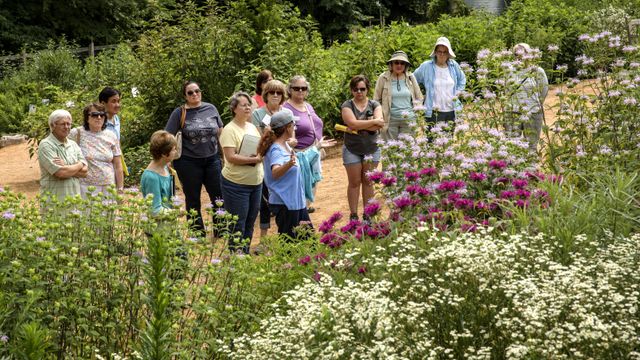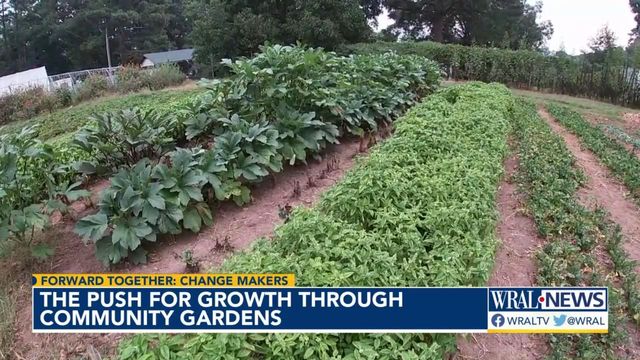What can you do about climate change? Start a natural garden.
Since he was five years old, Wake County native Tony Avent has been growing plants. Avent was seven years old when he started a greenhouse business, selling houseplants to his neighbors. Now, he owns a 28-acre botanical garden with more than 27,000 different plant species funded by an unparalleled plant nursery.
Posted — Updated"My blood is green," he said. "I get plants. It's not something I've spent time learning. It's something that was already there."
Avent went to school at North Carolina State University and studied under the late J.C. Raulston in the 70s.
"J.C. was the first person here, and he said, 'Please tell me you didn't quit your day job, because you can't run a specialty mail order nursery and make a living,'" Avent said.
Avent did just that. He and his wife sold their home and invested all the money they had — a couple thousand dollars — into a former tobacco field.
"That was sort of my determination. I've got my mentor telling me that this can't be done," Avent said. "Not only are we going to do it, we're going to start this world-class botanic garden and be able to fund that."
Avent was determined. For hours each day, he would dig into the tobacco field to make a plant bed. He didn't have much money, so instead he traded his friends plants for other services, like rocks needed to build his garden.
"I'm not going say it's been easy, because it's certainly not," he said. "There's times when you wonder how you're going make payroll, but you know, 36 years, we've been very blessed to be able to make this work."
Now, Juniper Level Botanical Gardens has 60 employees and it is open to the public free. The gardens make money by propagating and selling their unique cultivars to gardeners across the globe.
The importance of biodiversity in your home garden
It's no secret that an increase in the human population, and as a result a warming climate, has resulted in a decrease of biodiversity.
According to a report from the Worldwide Fund for Nature, between 1970 and 2016, global populations of mammals, birds, amphibians, reptiles and fish have declined on average by 68%. Scientists say this is directly tied to climate change and deforestation.
Steve Hall, a biologist with the North Carolina Biodiversity Project, said it's necessary for humans to learn to appreciate nature due to the threat of global warming.
"We cannot live without native ecosystems," he said.
The biodiversity project works to inform others about the importance of protecting the environment. Hall said that without thriving ecosystems, the Earth will no longer be able to sustain itself.
Avent emphasizes there is something each North Carolina resident can do to improve the state's biodiversity: start a garden. But not just any garden — one with a diverse selection of native plants. Those plants, he said, are not commonly found at box stores like Lowe's or Home Depot.
"If you go to a box store, I find generally around 50% of the plants that are sold there don't actually grow here. Because they don't really care," Avent said.
Avent encourages gardeners to think about their outdoor space the same way they do their indoor space.
"In an indoor space you have walls, ceilings, floors, furniture, and decorations," he said. "Everywhere you go [in the garden], we tried to create a little room, a room, a hallway. There are hundreds of those here."
Prospective gardeners are encouraged to visit the botanical gardens for inspiration. Avent said he and his team offer tailored assistance for each customer.
"We want to show people what's possible, because so many people, their idea of what's possible is what their nextdoor neighbor does. And a lot of the nextdoor neighbors do things really poorly," he said.
Hall recommends to improve the environment that people plant more native trees, like oak trees.
"Every little bit helps," he said. "Those simple, little actions we do as an individual have amounted to this global problem ... If all of us are contributing to the solutions, then there is some hope."
It damages the environment when people put exotic plants in their yard, or use a heavy amount of chemicals to keep their lawn green, Hall said.
Chemicals in home gardens kill bugs like caterpillars, which birds need to survive. If the bird population in an ecosystem declines, that can have widespread impacts on the insect, plant and animal population.
"We sometimes think we don't need nature anymore," Hall said. "We construct our own world and think that's all we need to do."
Related Topics
• Credits
Copyright 2024 by Capitol Broadcasting Company. All rights reserved. This material may not be published, broadcast, rewritten or redistributed.






